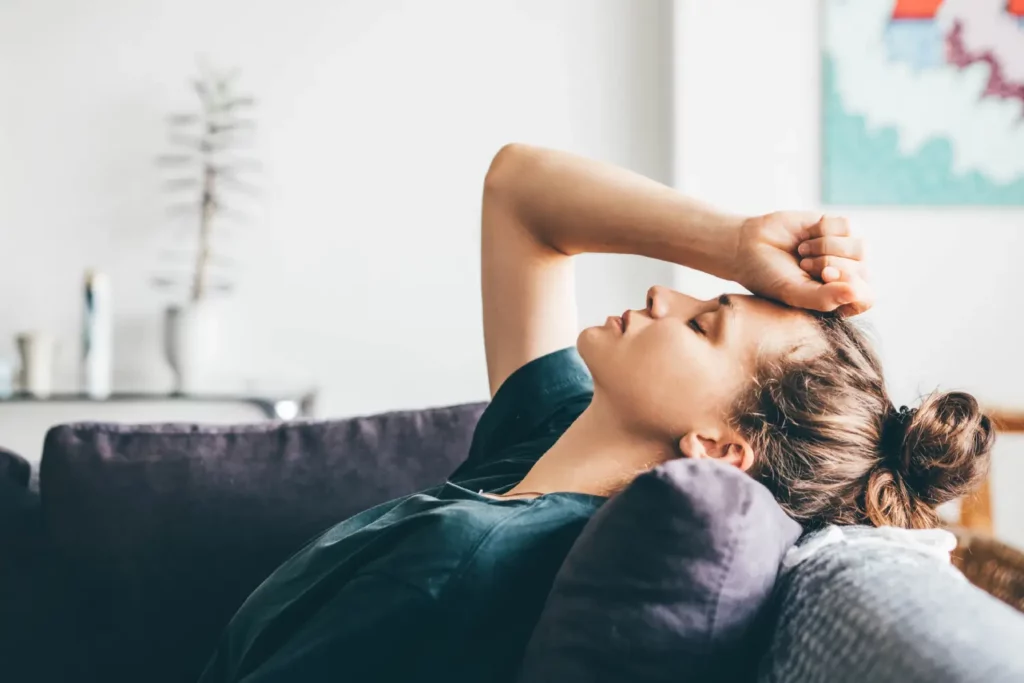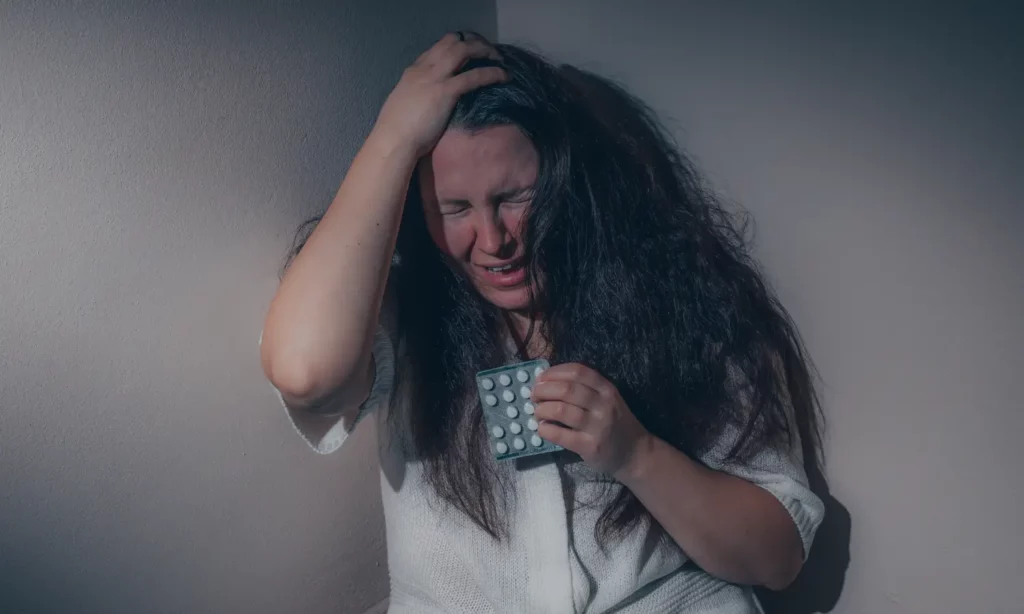Anxiety is a common yet often misunderstood mental health condition that affects millions of individuals globally. Its impact extends beyond emotional distress, significantly influencing daily life and overall well-being. In this article, we delve into the world of psychiatry and explore how consulting a psychiatrist can be a transformative step in managing and overcoming anxiety.
Contents
Definition of Anxiety
Before delving into the profound impact anxiety can have on daily life, it’s essential to understand what anxiety is. Anxiety is a complex emotional state characterized by excessive worry, fear, or unease about future events. It’s more than just occasional stress; it’s a persistent and often overwhelming feeling that can affect various aspects of a person’s life.
The Impact of Anxiety on Daily Life
 Now, let’s explore how anxiety can significantly influence one’s daily life:
Now, let’s explore how anxiety can significantly influence one’s daily life:
- Impaired Concentration: Anxiety can make it challenging to focus on tasks, whether at work, school, or in personal activities. The constant worry and intrusive thoughts can disrupt the ability to concentrate.
- Sleep Disturbances: Anxiety often goes hand in hand with sleep problems. Individuals may experience difficulty falling asleep, staying asleep, or having restless nights filled with anxious dreams.
- Impact on Relationships: The emotional toll of anxiety can strain relationships. Communication may become challenging, and individuals may withdraw from social interactions, affecting both personal and professional connections.
- Changes in Appetite: Some individuals may experience changes in appetite due to anxiety, leading to overeating or loss of interest in food. These changes can impact nutritional health.
- Negative Impact on Self-Esteem: Persistent anxiety can contribute to negative self-talk and a diminished sense of self-worth. Individuals may constantly question their abilities and feel a heightened sense of self-doubt.
- Impact on Physical Health: Anxiety is not limited to its emotional toll; it can have tangible effects on physical health. Chronic anxiety has been linked to conditions like cardiovascular issues and compromised immune function.
- Difficulty Making Decisions: The indecisiveness that often accompanies anxiety can make decision-making a daunting task. Simple choices may become sources of significant stress.
- Struggle to Relax: Individuals with anxiety may find it difficult to relax and unwind. The constant feeling of tension and apprehension can make it challenging to enjoy moments of peace.
Understanding the multifaceted impact of anxiety on daily life is crucial for recognizing when professional help may be necessary. The journey to overcoming anxiety often begins with acknowledging these challenges and seeking the support needed to address them.
Can a Psychiatrist Treat Anxiety Disorders?

Anxiety disorders are complex mental health conditions that can significantly impact an individual’s life. When grappling with the persistent and overwhelming effects of anxiety, many individuals wonder if a psychiatrist can truly help them overcome these challenges. Let’s explore the crucial role that psychiatrists play in assisting individuals in managing and overcoming anxiety disorders.
Comprehensive Diagnosis
Psychiatrists are trained to conduct thorough assessments to diagnose anxiety disorders accurately. Through detailed evaluations, they can determine the specific type of anxiety disorder and its underlying causes.
Medical Expertise
As medical doctors specializing in mental health, psychiatrists can prescribe medication when necessary. For certain anxiety disorders, such as generalized anxiety disorder or panic disorder, medication can be a crucial component of treatment.
Tailored Treatment Plans
Psychiatrists create personalized treatment plans that consider the unique needs and circumstances of each individual. These plans often involve a combination of medication, therapy, and other therapeutic interventions.
Therapeutic Interventions
Beyond medication, psychiatrists are skilled in various therapeutic approaches. Cognitive-behavioral therapy (CBT), exposure therapy, and other evidence-based interventions are commonly employed to address the root causes of anxiety.
Monitoring Progress
Regular check-ins with a psychiatrist allow for the monitoring of treatment progress. Adjustments to the treatment plan can be made based on the individual’s response and evolving needs.
Crisis Intervention
In moments of crisis or severe anxiety, psychiatrists can provide immediate support and intervention. Their expertise allows them to navigate acute situations and provide necessary assistance.
Collaboration with Other Professionals
Psychiatrists often work collaboratively with other mental health professionals, such as psychologists, counselors, and social workers, to ensure a comprehensive and holistic approach to treatment.
Education and Empowerment
Psychiatrists educate individuals about their anxiety disorders, helping them understand the nature of their condition. This knowledge empowers individuals to actively participate in their treatment and recovery.
Addressing Co-occurring Conditions
Psychiatrists are equipped to identify and address co-occurring conditions that may exacerbate anxiety disorders, such as depression or substance abuse. Treating these conditions simultaneously enhances overall outcomes.
n summary, psychiatrists play a pivotal role in the comprehensive and effective treatment of anxiety disorders. Their medical expertise, combined with therapeutic interventions and personalized care, positions them as valuable allies in the journey toward overcoming anxiety. Seeking the guidance of a psychiatrist is a proactive step that can lead to significant improvements in mental health and overall quality of life.
What to Expect from a Psychiatrist
 When considering seeking help from a psychiatrist for anxiety or any other mental health concern, it’s natural to wonder what the process entails. Here’s what you can expect when consulting a psychiatrist:
When considering seeking help from a psychiatrist for anxiety or any other mental health concern, it’s natural to wonder what the process entails. Here’s what you can expect when consulting a psychiatrist:
- Initial Assessment:
- A thorough evaluation of your mental health history, symptoms, and personal circumstances.
- Open and Honest Communication:
- A safe and non-judgmental space to openly discuss your thoughts, feelings, and concerns.
- Encouragement to share any relevant information that may contribute to understanding your condition.
- Collaborative Treatment Planning:
- Jointly establishing treatment goals and objectives based on your unique needs and preferences.
- Discussing various treatment options, including medication, therapy, or a combination of both.
- Explanation of Treatment Approaches:
- Clear explanations of recommended treatment approaches, ensuring you have a comprehensive understanding of the proposed interventions.
- Addressing any questions or concerns you may have about the suggested treatments.
- Medication Discussion:
- If medication is part of the treatment plan, a detailed discussion about the purpose, potential side effects, and expected outcomes.
- Collaboration on deciding whether medication is the right option for you.
- Therapeutic Interventions:
- Introduction to therapeutic interventions, such as cognitive-behavioral therapy (CBT) or other evidence-based approaches.
- Exploration of how these interventions can address specific aspects of your anxiety or mental health condition.
- Personalized Care:
- Tailoring the treatment plan to your individual needs, recognizing that one size does not fit all in mental health care.
- Adjustments to the plan based on your response and progress throughout the treatment.
Knowing what to expect from a psychiatrist can alleviate concerns and contribute to a more positive and collaborative therapeutic relationship. Remember, the ultimate goal is to work together towards improving your mental well-being and achieving a better quality of life.
Techniques Used by Psychiatrists in Anxiety Treatment

Psychiatrists employ a variety of techniques to address anxiety and other mental health conditions. These techniques are tailored to the individual’s needs and the specific nature of their anxiety disorder. Here are some commonly used techniques:
Medication Management
- Prescribing Medications: Psychiatrists may prescribe medications to alleviate symptoms of anxiety. Antidepressants, anti-anxiety medications, and beta-blockers are among the commonly prescribed drugs.
- Monitoring and Adjustments: Regular monitoring of medication effects and potential side effects. Adjustments are made based on the individual’s response and any emerging issues.
Cognitive-Behavioral Therapy (CBT)
- Identifying and Restructuring Thoughts: CBT focuses on identifying and challenging negative thought patterns contributing to anxiety. This technique helps individuals restructure their thoughts for a more positive mindset.
- Behavioral Exposure: Gradual exposure to anxiety-inducing situations to reduce fear and avoidance behaviors. This method aids in building resilience and adaptive responses.
Mindfulness and Relaxation Techniques
- Mindfulness Meditation: Incorporating mindfulness practices to increase awareness of the present moment. Mindfulness can reduce the impact of anxious thoughts and promote relaxation.
- Deep Breathing Exercises: Teaching deep-breathing techniques to manage physiological symptoms of anxiety, such as rapid heartbeat and shallow breathing.
Psychodynamic Therapy
- Exploring Unconscious Patterns: Psychodynamic therapy involves exploring unconscious patterns and unresolved conflicts contributing to anxiety. Understanding these underlying factors can facilitate long-term healing.
- Building Insight: Helping individuals gain insight into the root causes of their anxiety and addressing unresolved issues from the past.
Interpersonal Therapy
- Improving Relationship Skills: Focusing on interpersonal relationships and communication patterns. Improved social skills and relationship dynamics can positively impact anxiety levels.
- Identifying Social Triggers: Recognizing and addressing social triggers that contribute to anxiety in specific interpersonal situations.
Biofeedback
- Monitoring Physiological Responses: Using biofeedback devices to monitor physiological responses to stress and anxiety. Individuals learn to control these responses through mental and physical techniques.
- Promoting Self-Regulation: Biofeedback helps individuals develop self-regulation skills, enhancing their ability to manage stress and anxiety in real-time.
These techniques, often used in combination, create a comprehensive approach to anxiety treatment. The choice of techniques depends on the individual’s specific needs, the type of anxiety disorder, and the psychiatrist’s assessment of what will be most effective. The collaborative effort between the psychiatrist and the individual ensures a tailored approach that addresses both the symptoms and underlying causes of anxiety.
How to Find a Psychiatrist Near You for Anxiety?
 Navigating the process of finding a suitable psychiatrist for anxiety can be crucial for effective mental health care. Here are tips to guide you in the search, along with insights into the online services provided by TherapyMantra, specifically tailored for individuals with anxiety disorders:
Navigating the process of finding a suitable psychiatrist for anxiety can be crucial for effective mental health care. Here are tips to guide you in the search, along with insights into the online services provided by TherapyMantra, specifically tailored for individuals with anxiety disorders:
- Ask for Recommendations: Seek recommendations from your primary care physician, friends, family, or colleagues. Personal referrals often provide valuable insights.
- Check Online Directories: Utilize online directories, such as Psychology Today or Healthgrades, to find psychiatrists in your area. These platforms offer profiles, reviews, and contact information.
- Verify Credentials: Ensure the psychiatrist is licensed and board-certified. Verification of credentials is essential for receiving quality care.
- Specialization in Anxiety Disorders: Look for psychiatrists who specialize in anxiety disorders. Specialized knowledge ensures a deeper understanding of the unique challenges posed by anxiety.
- Review Treatment Approaches: Research the psychiatrist’s treatment approaches. Consider whether they integrate a combination of medication, therapy, and other evidence-based interventions.
- Check Availability and Accessibility: Evaluate the psychiatrist’s availability and accessibility. Consider factors such as location, office hours, and ease of scheduling appointments.
- Read Patient Reviews: Read patient reviews to gain insights into the experiences of others. Positive reviews can be indicative of a psychiatrist’s effectiveness and compassionate care.
Explore TherapyMantra’s Online Services
- TherapyMantra provides online psychiatric services specifically designed for individuals dealing with anxiety disorders.
- Access experienced and licensed psychiatrists with expertise in anxiety treatment. These professionals understand the nuanced nature of anxiety disorders.
- Benefit from flexible scheduling options that accommodate your routine. Virtual appointments make it convenient to connect with a psychiatrist from the comfort of your home.
- Ensure privacy with TherapyMantra’s secure and confidential online platform. A safe environment is crucial for open and honest discussions about mental health.
- Access ongoing support and follow-ups to monitor progress. Regular check-ins contribute to the effectiveness of anxiety treatment.
By combining traditional methods of finding a psychiatrist with the tailored services provided by TherapyMantra, individuals can enhance their journey to finding the right mental health professional to address anxiety effectively.
Conclusion
In conclusion, a psychiatrist plays a pivotal role in addressing the complex landscape of mental health, particularly when it comes to anxiety disorders. With expertise in diagnosis, treatment, and prevention, psychiatrists offer personalized and comprehensive care to individuals seeking support for their mental well-being.
If you find yourself with queries or uncertainties about mental health, don’t hesitate to seek guidance. The experienced therapists at TherapyMantra are here to help. Take the first step towards your mental well-being by booking a trial online therapy session. Your mental health is a priority, and the support you need is just a click away.


